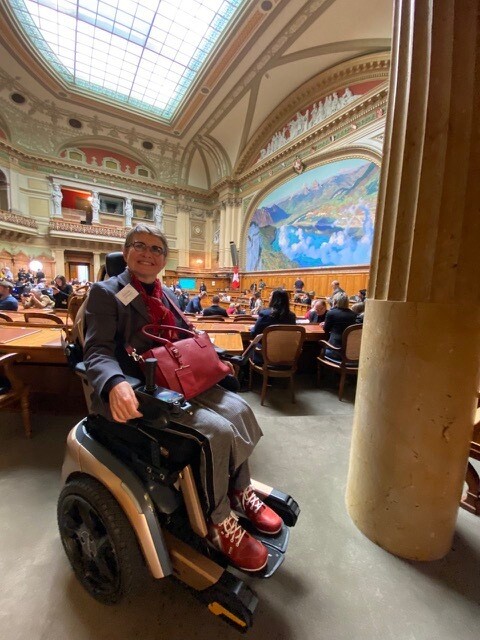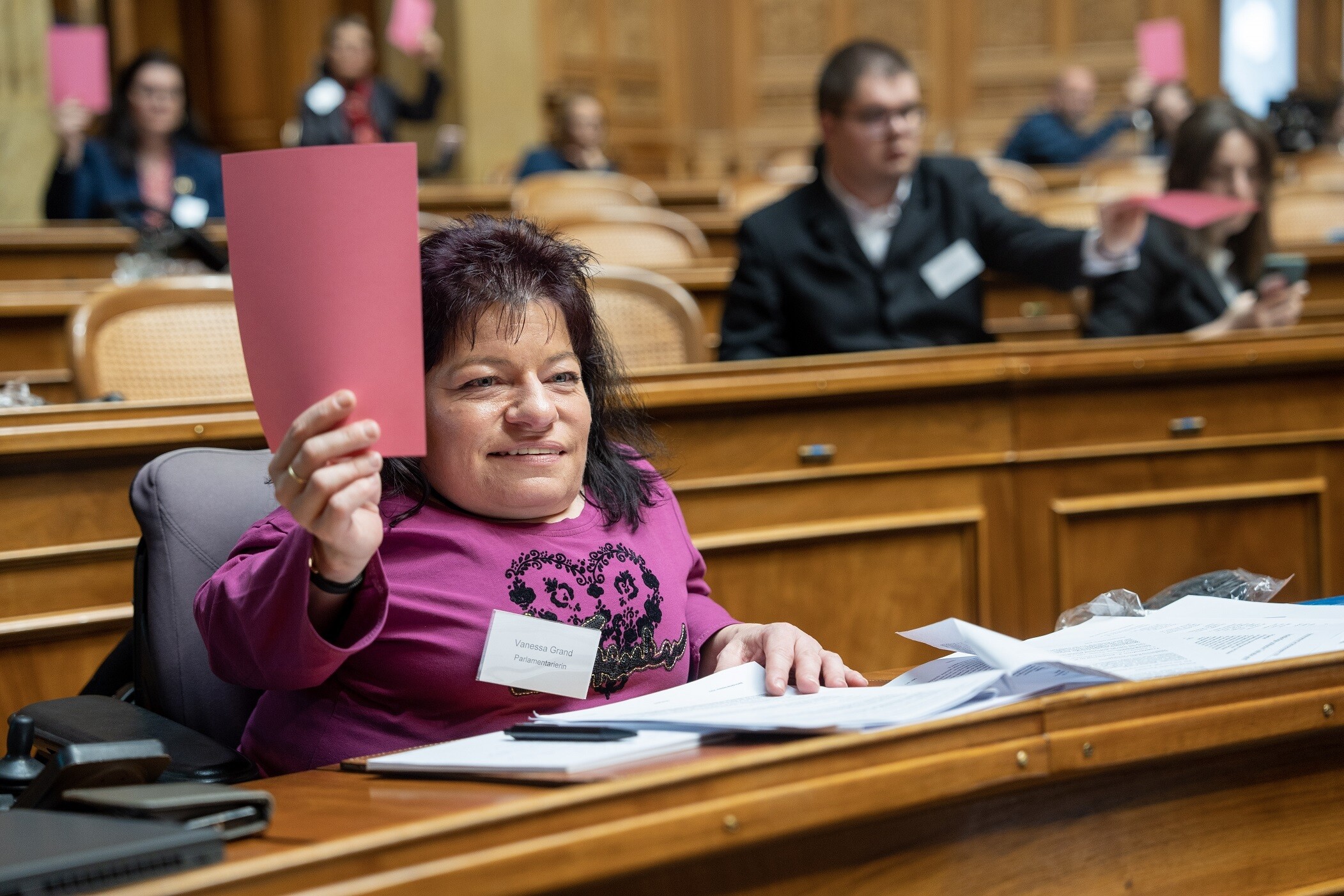The first Swiss Parliament session for people with disabilities is history. What remains of that day? What do affected persons want? We have asked them
- 5 minutes to read
- 24 April 2023
- Christine Zwygart
The first Swiss Parliament session for people with disabilities is history. What remains of that day? What do affected persons want? We have asked them
44 women and men have gathered in the Federal Parliament on March 24, 2023, for Switzerland's first session for people with disability – 44 out of 200 seats represent the current ratio of 22 percent of the population living with a disability. They debated under the leadership of National Councilor Christian Lohr, formed their opinions and finally adopted a Resolution for the attention of the President of the National Council Martin Candinas and the President of the Council of States Brigitte Häberli-Koller.

President of the National Council Martin Candinas (left) and National Councilor Christian Lohr in the lobby of the Federal Palace of Switzerland. (Image: © Pro Infirmis)
In the resolution, the affected persons call on politicians, authorities and society to enable more inclusion in politics: no deprivation of the right to vote and stand for election because of a disability, more equality and participation in political life, and appropriate representation at all political levels – right up to the Federal Council.
Watch the first session for people with disabilities in the National Council Chamber in full length.
But what remains after this afternoon in the Federal Parliament? How can the newly established and valuable contacts be used further? And did the participants feel taken seriously? We ask four women and men in wheelchairs elected to participate, whom we have already portrayed before the session.
“The depth and authenticity were overwhelming”
Anne Hägler (born in 1968) is very pleased that it was possible to raise people's awareness on a broad basis and bring the everyday problems of disabled people to their attention. "Just with this one day, many people have become aware that the situation is just not right for us." She was also impressed by the free speeches in the National Council chamber that some participants gave – "this depth and authenticity were simply overwhelming."

Anne Hägler is sure that the first session for people with disabilities in the Federal Parliament has raised awareness of the issue in society.
As a result of her multiple sclerosis disease, the Winterthur native has developed tetraplegia, which makes a wheelchair necessary. The session brought together men and women with different disabilities and very different challenges. But there is one thing that unites them all: “We are people who want to lead a completely normal life – and to achieve this, it wouldn't actually take all that much,” Anne Hägler is convinced. She now wants to carry the momentum, remain visible and active with the clear goal: “A second session is essential.”
“I think that was a loud drumbeat that woke a lot of people up.”
Anne Hägler
“We have come to stay”
Peter “Pesche” Buri (born in 1988) is overwhelmed by the day, the meeting with the political leadership, the “excellent work” before and during the session, the atmosphere, and the cooperation. “It felt good to be part of something so immensely bigger than me – it makes me want to do more.” He hopes that the time when each form of disability acts only in their own interest is now history.

Peter Buri takes the floor at the session, “We have a big responsibility because we represent 1.8 million people with a disability here.”
The Bernese has Duchenne muscular dystrophy type 2, a progressive neuromuscular disease. What he and the parliament for the disabled have been able to achieve remains to be seen. In his eyes, it would be nice if more people with disabilities also took on political offices: "We have come to stay." In the 2023 elections, the number of 44 disabled people in the National Council will probably not be reached, but perhaps a handful will make it – “and then we'll see”.
“I felt taken serious and heard – that's how many other participants felt.”
Pesche Buri
Politics has a duty – as do people with disabilities
Vanessa Grand (born in 1978) perceives it is a great honor to have been elected by the people to represent their interests in Bern. For her, it was particularly impressive to be able to cast her ballot at a seat in the National Council chamber, to lead discussions, “but also to meet members of the National Council and Council of States who paid us a visit.” The session was comparable one-to-one with a conventional session – and this gave it a correspondingly high priority.

Vanessa Grand casts her vote – and raises her voice: “We are experts in our own business.” (Image: © Pro Infirmis)
The Valais native lives with brittle bone disease and enjoys networking with everyone – whether disabled or not. Because there are points of contact across the board: “It's precisely the similarities AND the differences that make it.” Vanessa Grand is also convinced that the session will have a lasting impact. On the one hand, each of them should now persevere, while on the other hand, politicians must implement the adopted resolution. “Another session is definitely needed – this road never ends.”
“I am convinced that this session will have a lasting impact. However, it is now also up to us to pursue our office.”
Vanessa Grand
Raising awareness of the situation of people with disabilities
Martin Jaussi (born in 1966) has enjoyed meeting various politicians in parliament, especially from his home canton of Zug. So, on this day he also used Thomas Aeschi’s place in the hall. “It's precisely people like him that we need to win over for our cause,” he explains. In personal exchanges, he says, it is much easier to point out problems and talk about experiences from everyday life. “This raises awareness of our situation when it comes to cuts again in the next budget round ...”

Martin Jaussi (left) next to National Councilor Thomas Aeschi, who attended the session for people with disabilities.
Martin Jaussi was diagnosed with multiple sclerosis at a young age and is confined to a wheelchair. He is very active in the canton of Zug. Being able to represent his concerns at the federal level is great, he says: “This gives us a much bigger platform.” Like all the participants in this session for people with disabilities, the Zug native is convinced: Once doesn‘t count. Another meeting has therefore already been announced for mid-May.
“We listened to each other and let each other finish speaking. That was incredibly beautiful.”
Martin Jaussi

(Image: © Pro Infirmis)
What has the session for people with disabilities achieved? How should the political process in Switzerland continue?

